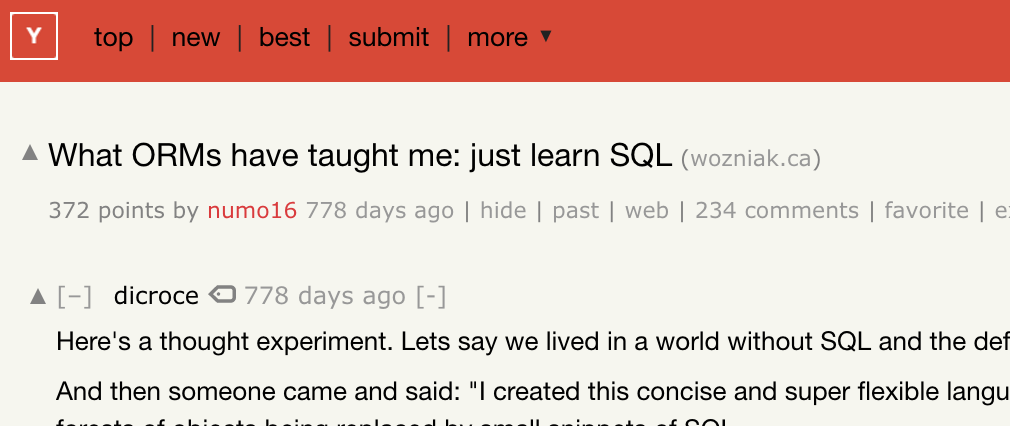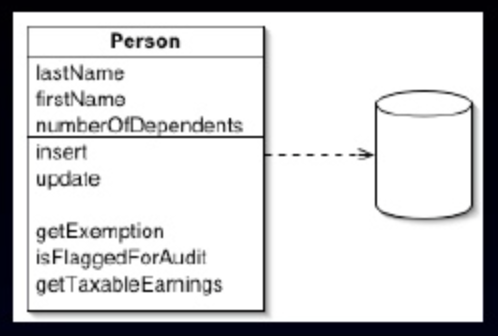Data Modeling in Python

Data in Applications
- Flat Files
- Key / Value
- Document Store
- Distributed (Map/Reduce)
- Relational Database
About This Talk
Concerned with relational data &
popular ways to model data in Python
Will not talk about web app design
Examples will use PostgreSQL
. . . And you should, too ;)

Traditional Data Manipulation with SQL

"I was watching my friends have this argument about manipulating… data, and how many… datas could one guy manipulate at once"
Accessing the database with inline SQL
pyodbc to make connection
DB-API PEP-249
- sqllite3
- psycopg2
- mysql-python
import psycopg2 as pg
host="192.168.99.100"
port="5432"
user="postgres"
dbname="postgres"
conn=pg.connect("host={} port={} user={} dbname={}".format(host, port, user, dbname))
cur = conn.cursor()
cur.execute("SELECT relnamespace::regnamespace, count(*) from pg_catalog.pg_class GROUP BY relnamespace;")
print(cur.fetchall())
some_parameter="pg_type"
cur.execute("SELECT relname from pg_catalog.pg_class WHERE relname = %s;", (some_parameter, ))
print(cur.fetchall())
conn.commit()
cur.close()
conn.close()
# [('pg_catalog', 208L), ('pg_toast', 36L), ('information_schema', 67L)]
[('pg_type',)]
Limitations
- An implicit transaction is always in progress
- Data type mappings vary by adaptor
- Parameter mapping varies by adaptor
- DB-API has own exception hierarchy
- Not every adaptor even implements DB-API
- Encourages string munging to create SQL statements
Enter the ORM
Object Relational Mapper
Conceptually borrowed from OOP
But you can use with other styles
Consistent typing within code
No change in code thinking (SQL is Set Based, Declarative)
So everybody loves ORMs, right?


Object/Relational Mapping is the Vietnam of Computer Science. It represents a quagmire which starts well, gets more complicated as time passes, and before long entraps its users in a commitment that has no clear demarcation point, no clear win conditions, and no clear exit strategy.
Common ORM Disadvantages
Still have to drop into SQL to handle complicated things
Whitewashes all DB platforms to make them the "same"
Impedence mismatch
Maybe the people who say those things just haven't found the right one. . .
Popular Python ORMs
- SQLObject
- SQLAlchemy
- Django ORM
- PeeWee
- PonyORM
ORM Types
Martin Fowler lists two types in Patterns of Enterprise Application Architecture (2003)
- Active Record pattern
- Data Mapper pattern
Active Record
The Django ORM uses an Active Record pattern
The ORM creates a 1:1 mapping of the relational data
Each object represents one distinct row of data

Data Mapper
SQLAlchemy is a Data Mapper
The ORM creates a generic layer that maps procedures to data
Each object represents a unit of work on a modelled data object (which may or may not correspond to a row of data)

Django ORM
Implements Active Record pattern
Written as part of Django framework (ca. 2005)
Known for ease of use, short learning curve
Simplifies writing easy queries (INSERT / UPDATE / DELETE)
Takes a similar amount of code relative to SQL for writing medium difficulty queries (GROUP BY, window functions)
But at least you get to write Python
Cannot feasibly handle complicated queries (GROUPING SETS, DISTINCT ON, aggregated sub-queries, CTE's, etc)
Other Limitations
And he wrote the thing
Does not use same syntax for simple things like field names
filter(field_name=value) Aggregate("field_name")Q(field_name=value) F("field_name")
Should be used to replace common queries, not to replace SQL
And while we're at it. . .
No support for composite keys
Cannot name automatically created objects like indexes
Primary keys are always serial integer
SELECT e.event_type
, sum(e.end_time - e.start_time)
FROM event as e
GROUP BY e.event_type
;
Event.objects.values(
"event_type"
).annotate(
Sum(F("start_time") - F("end_time"))
)
THIS DOES NOT WORK
Aggregates take string (not expressions)
SQLAlchemy
Data Mapper pattern
Written by Michael Bayer @Zzzeek, started in 2006
Framework agnostic
Design focus on using different db's in a consistent way
. . . While still exposing the unique functionality of different platforms
PostgreSQL != MS SQL Server != MySQL != Oracle
Bayer calls this "Hand Coded" application design
More About SQLAlchemy
Simple queries are still simple!
Mildly complex and more difficult queries are feasible, and relatively simple!
Really tricky stuff is still possible
Heavier learning curve, because it assumes you understand the database
That aggregate query in SQLAlchemy
session.query(
TimelineEvent.event_type,
func.sum(TimelineEvent.end_time - TimelineEvent.start_time)
).group_by(
TimelineEvent.event_type
).all()
This WORKS!
Data Modeling with SQLAlchemy
The engine and metadata
from sqlalchemy import create_engine, MetaData
engine = create_engine("postgresql://postgres@192.168.99.100/postgres")
metadata = MetaData()
from sqlalchemy import Table, Column, Integer, String
users = Table('user', metadata
, Column('user_id', Integer, primary_key=True)
, Column('user_name', String(50), unique=True, nullable=False)
)
metadata.create_all(engine)
The Declarative Model
from sqlalchemy import (
declarative_base
, Column, String, Integer
, ForeignKey, UniqueConstraint
)
SQLBase = declarative_base()
class hacker(SQLBase):
__tablename__ = 'hacker'
id = Column('hacker_id', Integer, primary_key=True)
handle = Column(String(50), nullable=False, unique=True)
class coding_language(SQLBase):
__tablename__ = 'coding_language'
id = Column('language_id', Integer, primary_key=True)
language = Column(String(50), nullable=False, unique=True)
class hacker_language(SQLBase):
id = Column('hacker_language_id', Integer, primary_key=True)
hacker = Column('hacker_id', Integer, ForeignKey('hacker.hacker_id'), nullable=False)
language = Column('language_id', Integer, ForeignKey('coding_language.language_id'), nullable=False)
UniqueConstraint('hacker_id', 'language_id', 'uq_hacker_language')
SQLBase.metadata.create_all(engine)
from sqlalchemy import sessionmaker
S = sessionmaker(bind=engine)
session = S()
hl = hacker_language
hl.hacker = 'Neo'
hl.language = 'Python'
try:
session.add(hl)
except:
session.rollback()
Reflection
SQLAlchemy can build models from the database
meta = MetaData()
meta.reflect(bind=engine)
hackerz = meta.tables['hacker']
Other concerns
- Roles and object permissions
- Many to one and many to many relationships
- Importing bulk data (csv, excel) - Simple!
- Database migrations - Feasible!
- Ad hoc queries
Thank you Python MKE
This presentation was built in reveal.js
